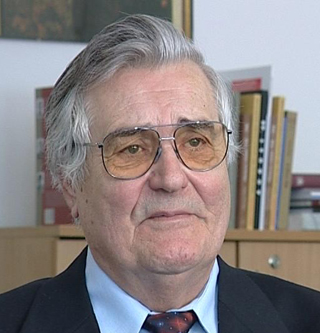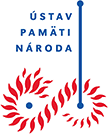Arpád Tarnóczy (1936)

Biography
“Human life has its meaning especially when people believe in something and do anything to achieve it.”
Arpád Tarnóczy was born on April 11, 1936, in the town of Nováky in an aristocratic family what influenced his entire life mainly after the year 1948. He studied at the Roman Catholic public school in Nováky, then he continued studying in Prievidza and Šaštín. As a nine-year-old boy he delivered papers and some money essential for escape to their acquaintances in concentration camp. For the first time he was arrested in 1946 for distributing leaflets entitled “Death to communism”. Three years later when he wasn’t eve fourteen years old, they charged him with alleged anti-state activities and sentenced him to half a year of imprisonment. After being released from prison, no school wanted to enrol him. So as a young boy (he wasn’t eighteen yet at that time) he started to work as an auxiliary worker. Later he got employed in chemical plants where he worked until the year 1990. Concurrently with being employed, he founded a swim team and then a water polo team as well. As his team had qualified for the first league, he was granted a dispensation and permission to attend the evening classes at the secondary industrial school. On February 2, 1957, Arpád Tarnóczy got married. He emerged as the leading person in the factory, since he organized the political movement called The Public Against Violence (VPN). It was the beginning of his political career. Later on, he became the head of the District Council. In the 90’s he was the Movement for Democratic Slovakia MP. He had the only one motivation – let people know what was happening in communist prisons. In 1996 he proposed the Bill on Amorality and Unlawfulness of the Communist Regime that was subsequently approved in the Parliament. Later he left politics and became the ambassador in Budapest, gained the Sovereign Military Order of Malta and also worked as a chairman of the Confederation of Political Prisoners of Slovakia.
Helping the Acquaintances in Concentration Camp
Arpád Tarnóczy - Helping the Acquaintances in Concentration Camp (data format Flash Video)
“In the year 1944, when I was just a schoolboy, some predictor cropped up that we had acquaintances in the labour camp, actually in a concentration camp for Jews. I didn’t meet them before but somebody had to take a backpack and bring them some clothes, travel tickets and papers issued by the notary, I think his name was Mr. Polakovič, who gave those papers to me. So I pretended to be Winnetou and took it as my homework to go to the camp “number two”. I got to the barrack number four and even into those people’s room. I appeared there, nine-year-old boy with backpack in his hands, and I pronounced those two names that I had repeated again and again during my way because they were really difficult German names. They went out with me and without any preparations we ran together across the field. It was about six or seven kilometres away. At night we went to the railway station in Zemianske Kostoľany and our friends, dressed in their civilian clothes, got on the train and I knew their escape had turned out well, because later we got a telegram from Zurich: ‘We have got a child! Our baby is healthy.’”
First and Second Arrest
Arpád Tarnóczy - First and Second Arrest (data format Flash Video)
“After dissolving the Salesian Institute they unified the grammar school and other secondary schools, actually former municipal schools, so I came back to Nováky. It was just for a while, because in 1949 I was arrested again. For the first time I was arrested in 1946, before elections, because I had distributed posters entitled "Death to communism." But it wasn’t a reason for my arrest. In this case the policemen just battered me at some committee residence and sent me home. Of course they had to write it somewhere because later it appeared in my file, even at the Nation’s Memory Institute. Those were very hard times. When I was at secondary school, in 1949 on Christmas Day they came and arrested me. I was charged with anti-state activities because we had a group and let’s say I was its leader for almost one year. Our group had four (five) members, boys from Nováky: Martin Hagara, Vlado Rajter, Anton Štrnga, me and my older brother Ladislav. We drew up the programme, certainly, it was a kind of child adventure for us, and so we didn’t find it dangerous. Although according to the accusation, we had prepared the dispatch of communist officials, we wanted to achieve coup d'état and depose people’s government - the matters usually connected to all the accusations in that era. To clarify it, I wasn’t fourteen years old when all these events happened. In 1949 I was arrested. I was brought to trial in February, though my fourteenth birthday was yet in April. I got just half a year what was a very mild punishment as I was charged with the clauses like high treason and banding together against the state, preparing armed resistance, and other clauses for which people usually got the gibbet as we used to call it in quod.”
Torture
Arpád Tarnóczy - Torture (data format Flash Video)
“We were literally tortured there, that’s the truth. We were forced to confess to many crimes. And as I had some experiences with investigators, I knew they would torture us until they would knock the confessions out of us, those confessions that somebody had written them because even typing with one finger was too difficult for them. They had no problem to use burning paper, to wrench our fingers with pencils, to press our hands this way, to wrick our legs, or whatever. Standing with nose leaned against the wall for twenty hours was enough for a man to lose all sense of reason. When I was in my cell I knew how long the interrogation had taken – sometimes it was even forty-two hours. I knew it just thanks to the number of mess-tins lying on the floor.”
Law
Arpád Tarnóczy - Law (data format Flash Video)
“When I was in Ďáblice, in Pankrác prison I had commanded the transferring crew for about six weeks. The transferring crew meant that we carried corpses wrapped in bags from the State Security offices and also from the place of execution to Ďáblice cemetery. We put some sand, lime and corpses into the ground beside the wall. Bag, sand, lime, corpses, we were forced to put three bodies into one hole. There I promised myself to bring everything what used to happen there into the light. I managed it in 1996, when I had been an MP for three years and when together with my friends I proposed a bill about amorality and unlawfulness of the communist regime. Act No. 125 from the year 1996 was approved, though just three votes decided it. This act denounced the communist era as an amoral and unlawful period. It consisted of many clauses, though when being debated, my original bill was curtailed a lot. In spite of it, I was satisfied that in preamble all of it was compared to a criminal organization, so I could say that passing that law was worth the effort. Well, three votes decided and it made me weep with joy.”
Message for the Next Generation
Arpád Tarnóczy - Message for the Next Generation (data format Flash Video)
“I think I was happy to be raised in accordance with religious principles. I believed in God. Maybe living in the Salesian hall of residence in Šaštín helped me as well. However, we truly learned to pray yet in prison. To clear it up, we learned to converse with God because, you know, it was dangerous to express your attitudes openly even in the prison. There were those who, for example, got fifty grams of bread or ten decagrams of jam more than others got in their allocations. In Jáchymov we went to the small window and according to quotas we fulfilled that day we got sauce, for instance. I would like to say that human life has its meaning only when people believe in something and do anything to achieve it. I was the happiest man when I managed to make somebody else happy or at least when I helped somebody to do that. I understood that it was the biggest joy and happiness, nothing could compare to it. I would be glad, if the next generation could believe in something what leads to welfare, love, truth, and honour. It is really worth it. Well, my life is the best evidence.”
The story and videoclips of this witness were put together and published thanks to the financial support of EU within the programme Europe for Citizens – Active European Remembrance.

